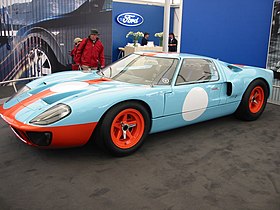GT40
| Ford GT40 | |
|---|---|
 |
|
| Overview | |
| Manufacturer |
Ford Advanced Vehicles John Wyer Automotive Engineering Kar Kraft Shelby American |
| Production | 1964-1969 105 produced |
| Assembly |
Slough, UK (Mk I, Mk II, and Mk III) Wixom, Michigan, USA (Mk IV) |
| Body and chassis | |
| Class |
Group 4 Sports Car Group 6 Sports Prototype |
| Body style |
Coupe Roadster |
| Powertrain | |
| Engine | 4181 cc (255 CID) V-8 4737 cc (289 CID) V-8 6997 cc (427 CID) V-8 4942 cc (302 CID) V-8 |
| Transmission | 4-speed manual |
| Dimensions | |
| Wheelbase | 95 in (2,413 mm) |
| Length | 160 in (4,064 mm) |
| Width | 70 in (1,778 mm) |
| Height | 40.5 in (1,029 mm) |
| Curb weight | 2,682 lb (1,217 kg)(Mk IIA 1966) |
| Chronology | |
| Successor | Ford P68 and Ford GT |
The Ford GT40 is a high-performance American-British endurance racing car based on the British Lola Mk6, with the Mk I, Mk II, and Mk III designed and built in England and the (Mk IV) built in the United States. The range was powered by a series of American-built engines modified for racing. The GT40 won the 24 Hours of Le Mans four consecutive times, from 1966 to 1969 (1966 being the Mk II, 1967 the Mk IV, and 1968-1969 the oldest chassis design, the Mk I), including a 1-2-3 finish in 1966. In 1966, with Henry Ford II himself in attendance at Le Mans, the Mk II GT40 provided Ford with the first overall Le Mans victory for an American manufacturer, and the first victory for an American manufacturer at a major European race since Jimmy Murphy´s triumph with Duesenberg at the 1921 French Grand Prix. The Mk IV GT40 that won Le Mans in 1967 is the only car designed and built entirely in the United States to achieve the overall win at Le Mans.
The GT40 was originally produced to win long-distance sports car races against Ferrari (who won at Le Mans six times in a row from 1960 to 1965). FORD/Shelby Chassis # P-1075, which won in 1968 and 1969, is the first car in Le Mans history to win the race more than once, with the same chassis. Using an American Ford V-8 engine originally of 4.7-litre displacement capacity (289 cubic inches). It was later enlarged to the 4.9-litre engine (302 cubic inches), with custom designed alloy Gurney-Weslake cylinder heads.
...
Wikipedia
